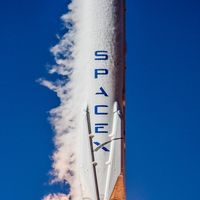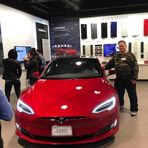Tesla's Indian Dream: A New Frontier for Electric Vehicles
February 19, 2025, 3:40 am

Location: United States, District of Columbia, Washington
Employees: 5001-10000
Founded date: 2002
Total raised: $7.53B

Location: United States, Texas, Austin
Employees: 10001+
Founded date: 2003
Total raised: $3.86B
Tesla is revving its engines for a grand entry into India. The electric vehicle giant is hiring, signaling its intent to tap into a market ripe for growth. This move follows a pivotal meeting between Elon Musk and Indian Prime Minister Narendra Modi during Modi's recent trip to the United States.
Tesla's LinkedIn page is buzzing with job postings. Thirteen roles are up for grabs, ranging from customer service to back-end operations. The positions are scattered across major cities like Mumbai and Delhi. This hiring spree is not just a routine expansion; it’s a strategic maneuver aimed at capturing a burgeoning market.
India's electric vehicle landscape is still in its infancy. Last year, electric car sales approached 100,000 units. In contrast, China, the titan of the EV market, sold a staggering 11 million. Yet, the potential in India is undeniable. With a population exceeding 1.4 billion, the demand for sustainable transportation is on the rise.
For years, Tesla hesitated to enter India. High import duties loomed like a dark cloud. The Indian government has now slashed the basic customs duty on high-end cars priced above $40,000 from 110% to 70%. This reduction is a green light for Tesla, making the market more accessible.
Musk's meeting with Modi was more than a casual chat. It was a strategic dialogue. The two leaders discussed not just Tesla's entry but also broader economic ties. Modi's government is keen on attracting foreign investment, and Tesla fits the bill perfectly.
The backdrop of this meeting included discussions about the U.S. trade deficit and military purchases. Modi and former President Trump touched on negotiations that could lead to significant military contracts, including the potential sale of F-35 fighter jets. This intertwining of business and politics adds layers to Tesla's ambitions in India.
Musk's role in the U.S. government complicates matters. His influence stretches beyond Tesla. He is a key player in discussions that blur the lines between corporate interests and political agendas. This duality raises questions about the motivations behind Tesla's push into India. Is it purely business, or is it also about strengthening ties between the U.S. and India?
Despite the complexities, the allure of the Indian market is strong. Tesla's entry could invigorate the local EV industry. It could also push other automakers to accelerate their own plans. Competition breeds innovation, and India stands to benefit from this influx of talent and technology.
The Indian government is rolling out the red carpet for electric vehicles. Initiatives to promote EV adoption are gaining momentum. Charging infrastructure is expanding, and incentives for consumers are becoming more attractive. Tesla's presence could catalyze these efforts, pushing the boundaries of what’s possible in the Indian automotive landscape.
However, challenges remain. The Indian market is diverse and fragmented. Consumer preferences vary widely across regions. Tesla will need to tailor its approach to resonate with local tastes. Understanding the nuances of the Indian consumer will be crucial for success.
Moreover, Tesla must navigate regulatory hurdles. The Indian bureaucracy can be daunting. Securing the necessary approvals and licenses may test Tesla's agility. Yet, if any company can rise to the occasion, it’s Tesla. The brand is synonymous with innovation and disruption.
As Tesla gears up for this new chapter, the stakes are high. The company recently reported its first annual drop in EV sales in over a decade. Entering India could be a lifeline, a chance to reignite growth.
The electric vehicle market is evolving rapidly. With the global shift towards sustainability, the demand for EVs is expected to soar. Tesla's timing could not be better. By establishing a foothold in India, the company positions itself at the forefront of this transformation.
In conclusion, Tesla's hiring spree in India is more than just a business move. It’s a strategic play in a complex game of geopolitics and economics. The meeting between Musk and Modi is a signal of intent. Tesla is ready to embrace the challenges and opportunities that lie ahead.
The road to success in India will be winding. But with determination and innovation, Tesla could become a key player in the Indian electric vehicle market. The journey has just begun, and the destination is electrifying.
Tesla's LinkedIn page is buzzing with job postings. Thirteen roles are up for grabs, ranging from customer service to back-end operations. The positions are scattered across major cities like Mumbai and Delhi. This hiring spree is not just a routine expansion; it’s a strategic maneuver aimed at capturing a burgeoning market.
India's electric vehicle landscape is still in its infancy. Last year, electric car sales approached 100,000 units. In contrast, China, the titan of the EV market, sold a staggering 11 million. Yet, the potential in India is undeniable. With a population exceeding 1.4 billion, the demand for sustainable transportation is on the rise.
For years, Tesla hesitated to enter India. High import duties loomed like a dark cloud. The Indian government has now slashed the basic customs duty on high-end cars priced above $40,000 from 110% to 70%. This reduction is a green light for Tesla, making the market more accessible.
Musk's meeting with Modi was more than a casual chat. It was a strategic dialogue. The two leaders discussed not just Tesla's entry but also broader economic ties. Modi's government is keen on attracting foreign investment, and Tesla fits the bill perfectly.
The backdrop of this meeting included discussions about the U.S. trade deficit and military purchases. Modi and former President Trump touched on negotiations that could lead to significant military contracts, including the potential sale of F-35 fighter jets. This intertwining of business and politics adds layers to Tesla's ambitions in India.
Musk's role in the U.S. government complicates matters. His influence stretches beyond Tesla. He is a key player in discussions that blur the lines between corporate interests and political agendas. This duality raises questions about the motivations behind Tesla's push into India. Is it purely business, or is it also about strengthening ties between the U.S. and India?
Despite the complexities, the allure of the Indian market is strong. Tesla's entry could invigorate the local EV industry. It could also push other automakers to accelerate their own plans. Competition breeds innovation, and India stands to benefit from this influx of talent and technology.
The Indian government is rolling out the red carpet for electric vehicles. Initiatives to promote EV adoption are gaining momentum. Charging infrastructure is expanding, and incentives for consumers are becoming more attractive. Tesla's presence could catalyze these efforts, pushing the boundaries of what’s possible in the Indian automotive landscape.
However, challenges remain. The Indian market is diverse and fragmented. Consumer preferences vary widely across regions. Tesla will need to tailor its approach to resonate with local tastes. Understanding the nuances of the Indian consumer will be crucial for success.
Moreover, Tesla must navigate regulatory hurdles. The Indian bureaucracy can be daunting. Securing the necessary approvals and licenses may test Tesla's agility. Yet, if any company can rise to the occasion, it’s Tesla. The brand is synonymous with innovation and disruption.
As Tesla gears up for this new chapter, the stakes are high. The company recently reported its first annual drop in EV sales in over a decade. Entering India could be a lifeline, a chance to reignite growth.
The electric vehicle market is evolving rapidly. With the global shift towards sustainability, the demand for EVs is expected to soar. Tesla's timing could not be better. By establishing a foothold in India, the company positions itself at the forefront of this transformation.
In conclusion, Tesla's hiring spree in India is more than just a business move. It’s a strategic play in a complex game of geopolitics and economics. The meeting between Musk and Modi is a signal of intent. Tesla is ready to embrace the challenges and opportunities that lie ahead.
The road to success in India will be winding. But with determination and innovation, Tesla could become a key player in the Indian electric vehicle market. The journey has just begun, and the destination is electrifying.